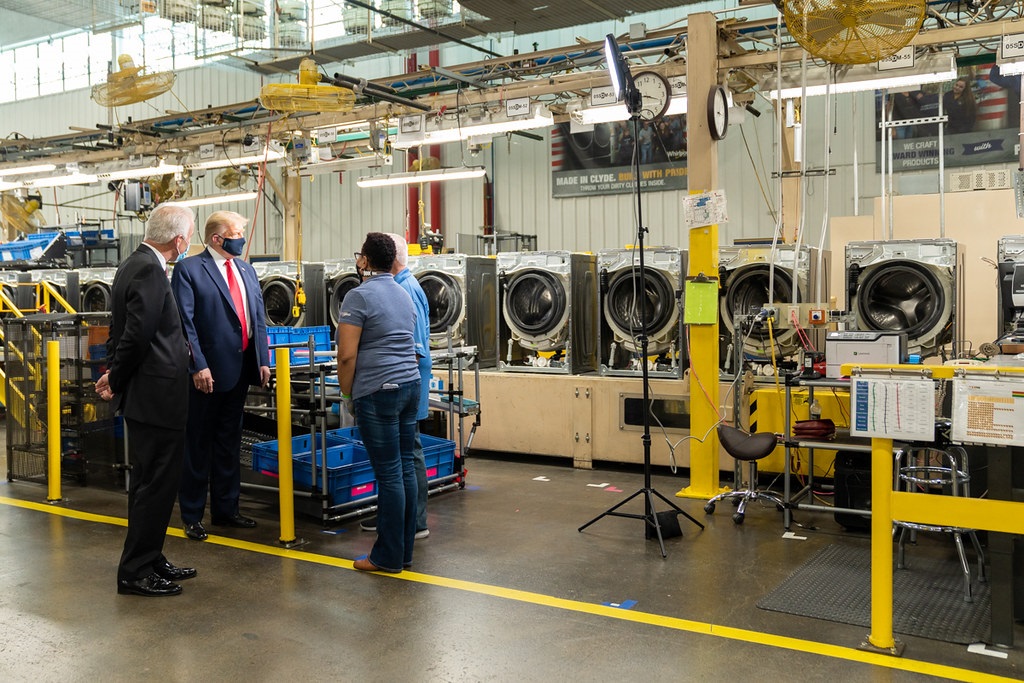The Peninsula
A Wash, Rinse, and Repeat of Trump’s Korea Tariffs?

U.S. trade policy with South Korea has already made its way into the 2024 Republican primary talking points. In former president Donald Trump’s interview with Tucker Carlson on the X platform, which took place in lieu of a Trump appearance at the Milwaukee Republican primary debate, the issue of Trump’s tariffs on South Korean washing machines was raised in the context of Trump’s trade concessions to the Midwest based home appliance manufacturer Whirlpool.
Trump explained to Carlson how successful his 2018 safeguard measures on washing machines were for the company stating, “I met with the head of Whirlpool, they were practically going out of business during my administration, and they said to me—from Ohio, incredible, great state, I love Ohio—they were really doing badly because people were dumping washing machines from all over—mostly from South Korea but also from China—and he was explaining it’s just a terrible situation.”
Trump then brought up his elimination of water restriction measures on washers and other appliances, which he asserted contributed to South Korean dumping of washing machines in the United States as well as his tariff measures to address the South Korean product competition.
“I said, ‘let me ask you, how’s the quality?’ He said, ‘we’re better but they have good enough quality.’ Of course, he’s going to say that. But, you know, they are better. But they don’t allow us—they’re dumping these machines, they’re cutting us in half, they’re killing us and on top of it the government won’t let us use water in our machines. He shows me like a quarter of a bottle of water, that’s supposed to be washing clothing. And I freed it all up, and I put tariffs on these countries that were selling—and the machines coming into the country.”
Trump’s comments refer to the tariffs he placed on foreign imports of large residential washers and their component parts in 2018 following a petition by Whirlpool Corporation asserting that imports from abroad, specifically from LG and Samsung, were causing injury to domestic industry. Such tariffs, which built off prior Obama era anti-dumping and countervailing duty measures placed on Samsung and LG, were controversial for their role in raising prices on appliances. Despite this, restrictions remained in place with their extension in January 2021, before expiring on February 7, 2023. Seoul’s initially lodged a complaint in the World Trade Organization’s dispute settlement body against the tariffs in 2018 which was upheld in a final ruling in favor of Korea this past April, affirming that the United States did not provide a “reasoned and adequate explanation” that the U.S. imports of washing machines from Korea suppressed domestic prices. Nevertheless, Trump’s championing of them to Carlson are a way of signaling his advocacy for the swing states in the American heartland such as Ohio, where companies like Whirlpool and others manufacture.
Trump went on to discuss the success of his tariffs had in bringing American industry back to life.
“And that company went from a big—all the washing machine companies—they make washing machines, they make dryers, they make all the different machines that do this kind of work, including dishwashers, and they went from a disaster area to being just thriving.”
While Trump himself asserted that his protectionist policy had a positive effect for American manufacturers, research on the economic effects of the tariffs has demonstrated that most of the cost of their implementation was passed onto American consumers, where manufacturers exploited their newfound market power to raise prices. Following the import restrictions, prices of washing machines and dryers rose nearly 12 percent, an increase of roughly $86 per unit as a result.
Where increased prices were one outcome, the intent to create positive externalities by reshoring American manufacturing jobs is another point of scrutiny. Trump’s 2018 announcement of the tariffs came just two weeks after Samsung had already moved an additional production line to the United States at a production plant in South Carolina creating a multitude of jobs. Furthermore, the net cost of the safeguard measures is thought to ultimately be a negative. University of Chicago researchers pointed out that the combined 1,800 new jobs created at Whirlpool, LG, and Samsung in the United States came at a cost of $817,000 per job netted with the $1.5 billion annual increase in consumer costs as a result of the trade protections.
While this type of trade protectionism may have been a feature of the Trump-Carlson discussion, it is fortunate that it did not make its way onto the stage in Milwaukee. There is still plenty of time for candidates to develop what their trade policy will be and how to accommodate U.S. allies and partners into a successful economic policy, but for Trump, a repeat of trade protectionism seems to be in order.
Tom Ramage is an Economic Policy Analyst at the Korea Economic Institute of America. The views expressed here are the author’s alone.
Photo from Trump White House Archived photostream on flicker Creative Commons by Shealah Craighead.
